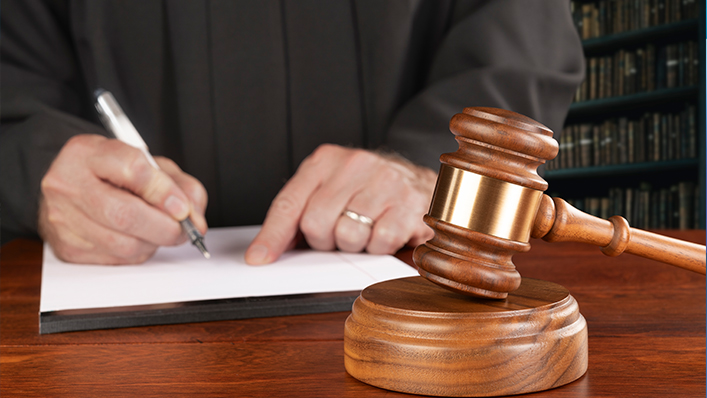
Nearly 20 members took the floor, some speaking on behalf of groups of members, to acknowledge the commitment made by ministers at MC12 and pledging their support for securing an outcome within the prescribed time period. Many welcomed the clear commitment from members at MC 12 to address the challenges facing the dispute settlement system, with several noting that discussions on this were already underway.
Ministers adopted an MC12 Outcome Document at the 12-17 July conference in which they “acknowledge the challenges and concerns with respect to the dispute settlement system including those related to the Appellate Body, recognize the importance and urgency of addressing those challenges and concerns, and commit to conduct discussions with the view to having a fully and well-functioning dispute settlement system accessible to all Members by 2024.”
The DSB chair, Ambassador Athaliah Lesiba Molokomme of Botswana, described the MC12 Outcome Document as very positive for the dispute settlement system. She expressed the hope that, going forward, members would be able to find a solution to the matter.
Mexico, speaking on behalf of 123 members, introduced for the 55th time the group’s proposal to start the selection processes for filling vacancies on the Appellate Body. The extensive number of members submitting the proposal reflects a common concern over the current situation in the Appellate Body which is seriously affecting the overall WTO dispute settlement system against the best interest of members, Mexico said for the group.
The United States said members are aware of the longstanding US concerns with WTO dispute settlement which remain unaddressed. Thus, the United States does not support the proposal. A true reform discussion should aim to ensure that WTO dispute settlement reflects the real interests of members and not prejudge what a reformed system would look like, it said. The US added it was prepared for continued and deepened engagement with members on the issue.
Mexico came back on behalf of the 123 proponents to say the fact a member may have concerns about certain aspects of the functioning of the Appellate Body cannot serve as pretext to impair and disrupt the work of the DSB and dispute settlement in general, and that there was no legal justification for the current blocking of the selection processes.
Under this item, ten members took the floor to express their strong opposition to the invasion of Ukraine. The Russian delegate responded by saying that the WTO was not the proper venue for a discussion of this nature.
DS595 European Union — Safeguard Measures on Certain Steel Products
The European Union noted that at its previous meeting on 31 May the DSB adopted the panel report in DS595 in the case initiated by Türkiye and that it wished to inform members of its intentions with respect to implementation.
The EU pointed out that the panel recommended the EU bring its measure into conformity with the WTO’s Safeguards Agreement and the General Agreement on Tariffs and Trade (GATT). Given the implementation task at hand, it is impracticable for the EU to comply immediately. Therefore, it needs a reasonable period of time to do so. The EU said it is keen to discuss and agree with Türkiye on the length of this period of time at the earliest available opportunity.
Türkiye noted that the panel found the EU safeguard measure fell short of essential substantive requirements set out in the Safeguards Agreement and the GATT. Given those findings fundamentally affect the legality of the EU measures, Türkiye said it expects that an immediate review by the EU should lead to the withdrawal of the safeguard at issue.
Türkiye said it takes note of the EU request for a reasonable period of time to implement and looked forward to working with the EU on that.
Other business
In his role as facilitator, Ambassador George Mina of Australia reported on the “very good news” regarding the agreement reached between the Philippines and Thailand aimed at resolving their longstanding dispute regarding customs valuation procedures for imported cigarettes (DS371).
Under the Agreed Procedures Understanding signed on 7 June, the Philippines and Thailand have established a bilateral consultative mechanism which will serve as a channel for their respective authorities to cooperate, with the objective of reaching a comprehensive settlement to the dispute.
Amb. Mina said the active and constructive engagement by the two parties to arrive at the Agreed Procedures Understanding serves to further highlight their commitment to the WTO dispute settlement system. This Understanding makes clear that there are “creative alternative means available” to resolving disputes, he said.
Both Thailand and the Philippines welcomed the Understanding and pledged to work together in order to reach a mutually acceptable solution to the dispute. Ambassador Molokomme described the Understanding as a positive outcome which shows it is possible to find alternative ways of progressing the resolution of disputes, notwithstanding the absence of a functioning Appellate Body.
Surveillance of implementation
The United States presented status reports with regard to DS184, “US — Anti-Dumping Measures on Certain Hot-Rolled Steel Products from Japan”, DS160, “United States — Section 110(5) of US Copyright Act”, DS464, “United States — Anti-Dumping and Countervailing Measures on Large Residential Washers from Korea”, and DS471, “United States — Certain Methodologies and their Application to Anti-Dumping Proceedings Involving China.”
The European Union presented a status report with regard to DS291, “EC — Measures Affecting the Approval and Marketing of Biotech Products.” Indonesia presented its status reports in DS477 and DS478, “Indonesia — Importation of Horticultural Products, Animals and Animal Products.”
Next meeting
The next DSB meeting will take place on 21 July.
Share
Reach us to explore global export and import deals